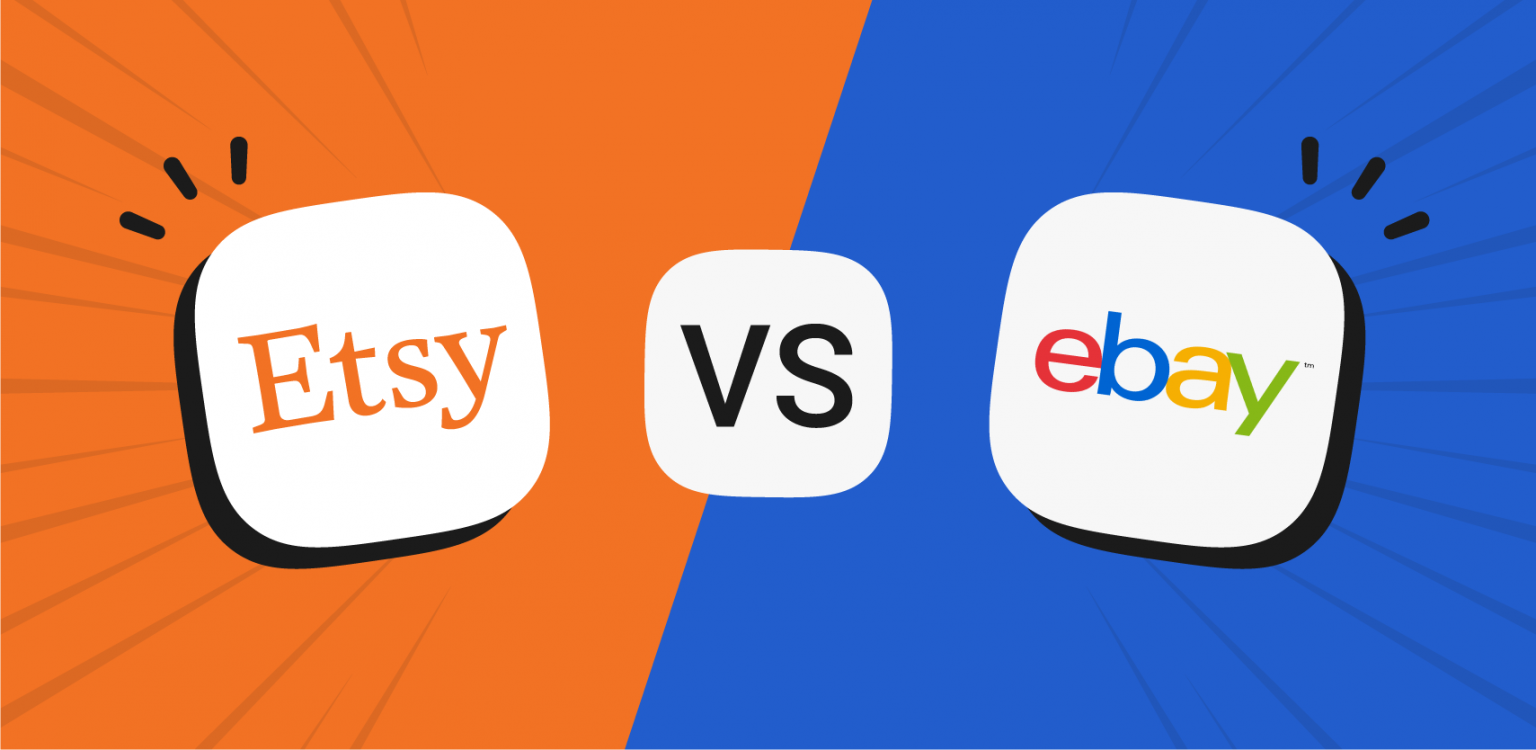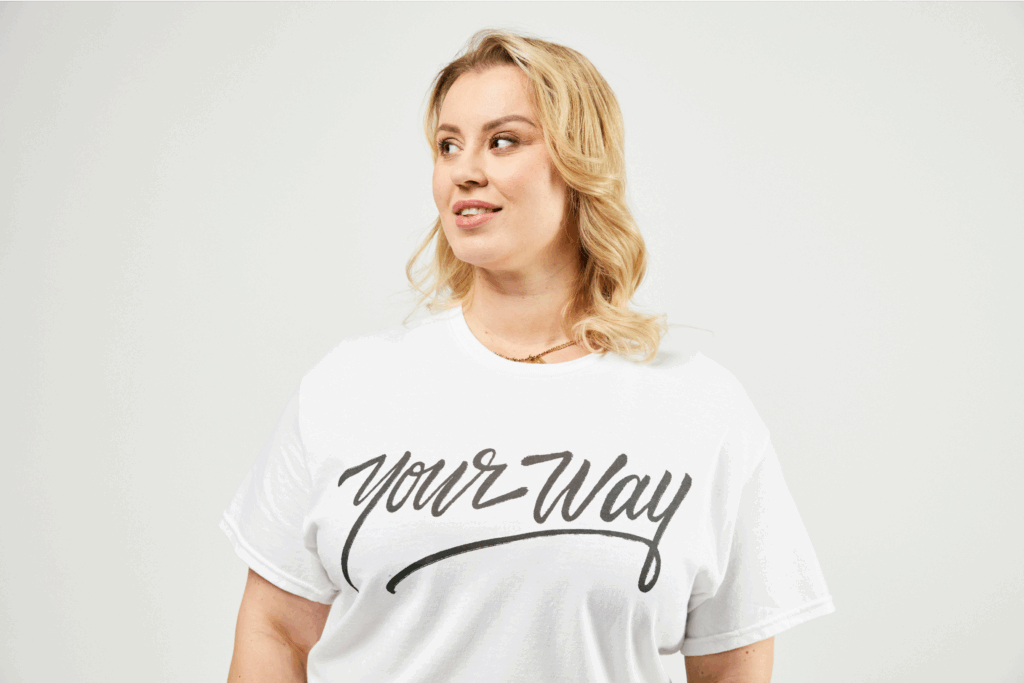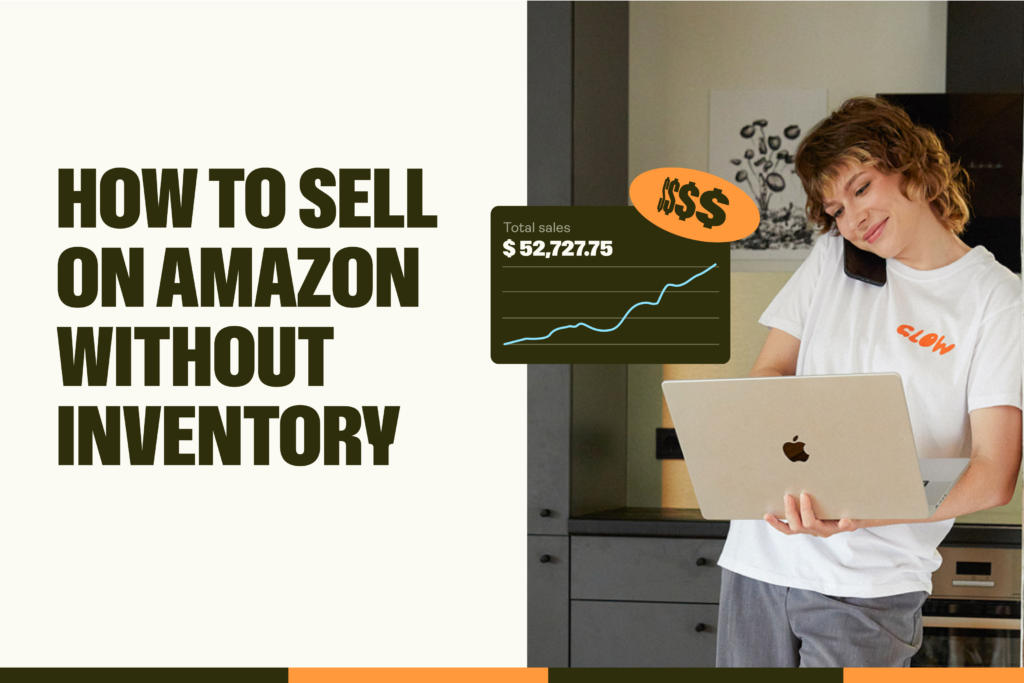Printify + your favorite platform = more sales!
Retail eCommerce sales are expected to reach $8.1 trillion by 2026, making the debate on Etsy vs Ebay as heated as ever – it’s an epic rivalry similar to Mcdonald’s vs Burger King, Coca-Cola vs Pepsi, or Uber vs Lyft.
They’re both well-known eCommerce marketplaces, but how do they differ and which platform is the best for sellers in 2025? There is a long list of features to consider when choosing between these two popular marketplaces, which will determine your user experience and chances of success.
eBay vs Etsy: Overview
![eBay vs Etsy Overview Etsy vs eBay – Choosing the right platform in [bp_year] 1](https://printify.com/wp-content/uploads/2023/02/eBay-vs-Etsy-Overview.jpg)
Etsy
Tap into an audience of over 96 million active buyers, eager to buy unique goods.
This online marketplace provides an unmatched opportunity for small and growing businesses led by artists, crafters, and creators to establish a solid presence in eCommerce.
With Printify, you can easily customize and sell products on Etsy.
Start your Etsy print on demand business today!
eBay
With approximately 132 million active buyers, eBay has grown into one of the largest and most diverse eCommerce platforms in the world.
Although you can find vintage items on this online marketplace, eBay offers a large range of products from electronics and fashion to collectibles and sports equipment.
Easily link your store with Printify through the help of our automated sales channel integrations.
Etsy vs eBay: Quick comparison
| Etsy | eBay | |
|---|---|---|
| Ease of use | Clean and easy-to-navigate user interface. | Higher product range and more features add clutter and complicate navigation. |
| Product focus | Top sellers include jewelry, craft supplies, handmade items, and wedding products. | The top categories are clothing and accessories, health and beauty, fitness, jewelry and watches, pet supplies, and home and garden. |
| Pricing | Lowest overall fees. Mandatory, region-specific, and optional – see the full list here. | Higher fees than average, with the exception of a minimum of 250/month zero insertion fees. Check eBay’s guide for the full list of fees. |
| Design features | Custom shop icon, page banner, description, featured items. Extra design features with Etsy Plus and Pattern. | Custom store logo, banner, product categories, description, featured Items. More features with the eBay Store subscription. |
| Analytics | Best for starting businesses. | More benefits for high volume sellers. |
| Marketing tools | Seller Handbook, onsite and offsite ads. | Custom store newsletters, connections to social media platforms. Extra marketing tools with the eBay Store subscription and Terapeak. |
| SEO | Etsy’s search bar, guides on how to optimize your product listings on Google. | eBay’s Cassini search engine, access to the Terapeak analytics service. |
| eCommerce tools | Etsy app, Seller Handbook, Community Forums, calculated shipping, access to third party apps. | eBay app, shipping calculator, Seller Hub, selling templates, Promotions Manager, access to third party providers. |
| Customer support | Help center, community forums, email support. | eBay Community, Automated Assistant, email and chat support. |
| Scalability | Best for small to medium-sized businesses. | Great for small businesses to large retailers. |
Make it happen today!
Etsy vs eBay: A Detailed comparison
For your convenience, we’ve summed up the main factors to consider when deciding between opening an eBay or Etsy shop.
1. Ease of use
Both Etsy and eBay offer an easy way to sell products and connect with your target audience. Ease of use goes a bit beyond just your seller experience – it’s also the experience of your customers.
Etsy: It’s user-friendly interface is clear and easy to navigate for both new and experienced business sellers, as well as Etsy shoppers.
Etsy offers curated product categories, making shopping a breeze for anyone that wants to buy specific goods.
eBay: Creating an account and setting up shop is easy, but online selling is a bit more complex.
The downside of providing a higher number of features and options is that it can make it harder to navigate eBay for both the seller and buyer.
Winner
Etsy. The platform’s user interface and Shop Manager are easier to navigate.
The website and mobile app have a clean layout, highlighting text and featured products.
2. Product focus
![Product Focus Etsy vs eBay – Choosing the right platform in [bp_year] 3](https://printify.com/wp-content/uploads/2023/02/Product-Focus.jpg)
What you plan to sell determines the best online marketplace for your online business.
Etsy and eBay place a different emphasis on the types of items they feature, catering to a variety of sellers and buyers across different niches.
Etsy: The clear focus is placed on vintage items, handmade goods, and craft supplies, primarily catering to artistic and creative buyers and art collectors.
Take a look at our guide on things to sell and the best selling items on Etsy to gather some useful insights.
eBay: A large variety of products, both new and used. Everything from electronics and car parts to fashion and vintage goods, appealing to a broad range of buyers.
Winner
It’s a tie. The best platform depends on the type of products you’ll be selling. Clothing and accessories work on either platform, but electronics sell better on eBay.
3. Pricing
From payment processing to final value fees, there are many mandatory and optional payments to keep in mind.
Refer to our Etsy vs eBay fee comparison table for a detailed overview of the fees you’ll encounter on each platform:
| Etsy fees | eBay fees |
|---|---|
| – Listing Fee It’s $0.20 for every product listing you post. Listing fees renew every four months by default. – Transaction Fee Etsy collects 6.5% from the total of every sale you make. Transaction fees include the total cost of the product, shipping, and gift wrapping. – Payment Processing Fee This fee is a percentage of the total sales price and a flat fee per order. The processing fee for Etsy payments is 3% plus $0.25 in the United States. Check rates for other counties in Etsy’s fee amount table. – Region-Specific Fees There is a 2.5% currency conversion fee if your customer places an order in a currency other than USD. There’s also sales tax and VAT, which are based on the location of your customers. Etsy collects and remits these taxes in a large number of applicable countries. – Advertising Fees If you use optional services like onsite and offsite ads, you will incur additional fees for ad clicks or sales attributed to these ads. Onsite Etsy ads range from $0.20 to $0.50. If your store has made less than $10,000 in the last 365 days, your off-site ads fee will be 15% from the order total. The fee is reduced to 12% if you reach $10,000. – Subscription Fee If you’re using Etsy’s subscription packages – Etsy Plus costs $10/month. | – Insertion Fee This is eBay’s listing fee. It’s charged on every original product listing per product category. If you’re an individual seller or have the Basic eBay Store plan, you’ll get up to 250 zero insertion fee listings every month. Each listing on top of that will cost you $0.35 per listing. – Final Value Fee eBay charges a final value fee every time a sale is made. Final value fees are calculated from a percentage of the total sales amount plus $0.30 per order. The percentage differs by product category, but can be up to 15%. – Optional Fees You’ll incur fees for stylistic listing upgrades, which vary depending on item price, listing format, and duration. – Store Subscription Fee If you plan to sell on a professional level, you’ll encounter a monthly or yearly subscription fee ranging from $4.95/month for a Starter Store up to $2,999.95/month for an Enterprise Store. – Classified Ad Fee If you’re using eBay Ads, you’ll pay $9.95 for a 30-day listing without any final value fees if an item sells. – International Fee If you’re not using eBay International Shipping for sending items to countries outside of the United States, you will incur a fee of 1.65% from your order total. |
Winner
Etsy is the overall winner, as it generally has the lowest fees, but eBay is an easier platform to start on due to its zero insertion fees.
4. Design features
A visually appealing and well-branded storefront can make a significant difference in attracting and retaining customers.
Etsy and eBay both provide tools to enhance the design of your online shop.
Etsy: Allows you to customize your storefront with a shop icon, page banner, description, featured items, and a detailed About section.
Etsy Plus enables you to add a Carousel or Collage store banner, and more Featured Items customization options.
Set up with Pattern to build a separate, personalized website for your online business.
Keep in mind that your Etsy Pattern store will have your Etsy inventory and you’ll be able to manage it through the Shop Manager, but it won’t show up through Etsy’s search bar.
eBay: Lets you organize your eBay listings in product categories, add a store banner, and customize a section of Featured Items.
The eBay Store subscription offers a separate eBay page with your own URL and customized storefront.
Winner
eBay, because nothing beats a separate storefront that can be found on a popular marketplace search engine.
5. Analytics
![Analytics Etsy vs eBay – Choosing the right platform in [bp_year] 7](https://printify.com/wp-content/uploads/2023/02/Analytics.jpg)
Detailed and accurate store analytics is at the core of every successful eCommerce business.
Both Etsy and eBay offer tools that give insights into sales, customer behavior, and more.
Etsy: The platform simplifies this process by offering straightforward figures on metrics like store traffic, total revenue, and profit margins.
Etsy users have access to a CSV spreadsheet which presents your store transactions in a reader-friendly format.
eBay: This marketplace provides a variety of features that simplify both store and order management.
The Reports page on the eBay Seller Hub allows you to create and update product listings in bulk, fulfill and mark orders as shipped, generate reports, and manage customer feedback.
Winner
Etsy is the winner for starting businesses, while eBay’s features are great for high volume sellers.
6. Marketing tools
Promoting your products effectively is key to driving sales and growing your business.
Both Etsy and eBay offer marketing tools to help you reach your target audience.
Etsy: Aside from offering detailed marketing and advertising guides through the Seller Handbook, Etsy also gives you an option to run onsite and offsite ads that turn clicks into sales.
Quick tip
Refer to our blog on Etsy advertising and Etsy marketing for more valuable insights to help your business scale.
eBay: Use eBay templates to create and customize store newsletters to notify customers about new listings and share your brand story.
The Social page on allows you to link up your Facebook, Instagram, and Pinterest social media pages. Etsy will use the right text, images, and hashtags to help you gain new and returning customers.
If you’re an eBay Store subscriber, you can use the Promotions Manager to easily run promotions, as well as offer coupons and discounts to your customers.
Set up with Terapeak to access additional advanced marketing tools for market analysis.
Create promoted listings and even try Etsy’s Offsite Ads BETA to help shoppers find your store.
Winner
eBay, since it offers a much greater variety of built-in marketing tools.
7. SEO
![SEO Etsy vs eBay – Choosing the right platform in [bp_year] 10](https://printify.com/wp-content/uploads/2023/02/SEO.jpg)
Search engine optimization is one of the best ways to ensure your target audience finds you.
Understanding the SEO practices of these two marketplaces will allow you to optimize your listings for maximum visibility.
Etsy: If you use the right keywords on your Etsy listings, the platform’s algorithms will make your products easy to find through Etsy’s search bar.
Quick tip
Check out our guide on how to get noticed on Etsy to learn tricks of the trade.
All Etsy Sellers are also encouraged to use descriptive and relevant product titles to ensure seamless product discoverability.
The Etsy guide on understanding Google SEO helps you optimize your Etsy listings.
eBay: The Cassini internal search engine takes your eBay shop ad compliance, seller performance, return policy, and various other factors into account, when generating quality search results for customers
Use the Terapeak analytics service for keyword research and remember to only add keywords that directly relate to your eBay listings.
Quick tip
Join the eBay Academy to master all eBay tools and features from SEO to expert strategies.
Winner
It’s a tie, because you can reach store success by using SEO on either platform.
8. eCommerce tools
Both eBay and Etsy sellers have access to various features and seller tools that will help you simplify and automate your online store operations.
Etsy:
- Etsy app is the perfect mobile tool for selling on the go.
Manage and track orders, add videos and photos to your product listings and even receive a notification if you get a repeat buyer. - Seller Handbook. A treasure trove of knowledge that lets you gain valuable insights on how to use the Etsy Marketplace.
Learn how to add product listings, sell vintage items, understand Etsy ads, navigate seller fees, and start selling on Etsy. - Community Forums. Etsy encourages sellers to support and interact with other Etsy sellers.
Engage with the community by reading and sharing tips, tricks, and constructive feedback. - Calculated shipping. Simplify the shipping process and transparency with your customers.
It’s available for sellers in the US and Canada who use USPS, Global Postal Shipping, or Canada Post shipping labels. - Integrations. Use third party tools to manage social media presence, monitor and analyze store analytics, or optimize product listings and your store.
It’s also your way to connect a print-on-demand service like Printify to fulfill customer orders.
eBay:
- eBay app. Create and edit listings, adjust shipping costs, and get an instant notification whenever an item sells.
It’s your way to never miss out on a sale, no matter where you are. - Shipping calculator. eBay sellers have the option to calculate the exact cost of sending items through various shipping carriers.
Use the shipping calculator to set the shipping cost to vary by buyer location, making sure you don’t lose a part of your profit to shipping costs. - Seller Hub. Manage listings, monitor and analyze your store performance and daily sales trends to identify your top performers.
Gain insights on your competition and how your buyers find your products. - Selling templates. Create reusable templates to streamline the process of listing products on the eBay online marketplace.
It’s easy to edit, rename, or delete them, and a great way to ensure consistency across your online store. - Promotions Manager. It’s one of the top features available for eBay Store subscribers.
The Promotions Manager enables you to create promotions, offer product and shipping discounts, drive repeat purchases, and attract new customers. - Third party providers. Use additional software and services to automate store operations.
Try solutions for order and inventory management, listing optimization, as well as order fulfillment and shipping – check out Printify’s eBay integration.
Winner
eBay, because of a wider selection of tools to help you manage, automate, and grow your online business.
9. Customer support
![Customer Support Etsy vs eBay – Choosing the right platform in [bp_year] 13](https://printify.com/wp-content/uploads/2023/02/Customer-Support.jpg)
Having access to reliable customer support is an absolute necessity for resolving issues and a smooth selling experience.
Etsy and eBay provide customer support resources, though their approaches differ.
Etsy: Although it is technically possible to reach Etsy’s customer support, they are not easily accessible.
Your first point of contact will be the Help Center, which can aid with some basic concerns, but it won’t always provide the best answers to your specific questions.
If you can’t find the information you need and still need assistance, select a category that’s thematically related to your concern and press the grey “I still need help” button at the bottom of the page.
This will redirect you to an email form, but neither chat nor phone options are currently available.
Thankfully, there are also Etsy Community Forums, where you can connect with other sellers or search for answers to similar questions.
eBay: The eBay automated assistant is available at the bottom of the Help page.
It will answer most generic questions, or enter a queue to speak to a human support agent.
The Help page offers the option to email your questions to Etsy’s support team.
There’s also an option to bring your questions to the eBay Community.
Winner
eBay is the clear winner in this category because you can reach them much easier and faster.
10. Scalability
As your business grows, the scalability of online marketplaces becomes essential.
Both the Etsy and eBay platforms offer different ways to grow your business, regardless of whether you’re selling handmade items or mass-produced goods.
Etsy: The platform is best suited for small to medium-size businesses that sell handmade and customized goods.
Scalability options are limited to expanding product range and establishing a loyal customer base.
eBay: Ideal for small sellers to larger retailers, because it offers necessary tools for market analysis and promotion to a large segment of potential customers.
Winner
eBay, as it offers more ways to promote your business and make bulk product edits.
Make it happen today!
Pros and cons of selling on Etsy
Learning how to sell on Etsy is pretty simple and easy – the first thing is head over to Etsy and click on Get started.
Follow through the Etsy store setup. Some of the steps include choosing a store language, selecting your country, and creating a store name.
If you don’t want your first listing fee to go to waste, use our Product Creator (formerly known as Mockup Generator) to create custom product mockups, download the mockup file and use it on your Etsy product listing.
Quick tip
Refer to our step-by-step Etsy guide for more tips to follow during setup.
Pros:
- Large global marketplace
- Easy setup
- Multiple payment methods
- Etsy Community
- Easy to add products to the marketplace
- Etsy mobile app.
Cons:
- Limited scalability for large businesses
- High competition
- Limited marketing options
- Limited branding and customization
Pros and cons of selling on eBay
While Etsy needs you to create products before you’ve even launched your store, eBay only asks for an email address to get started.
Before you start selling, you’ll need to go through a few additional steps– verify your identity, add a payment method, and your store is good to go.
Connect your store to Printify, create custom products, and publish them on eBay within minutes.
Pros:
- Easy to set up and use
- Zero listing fees
- High earning potential
- Large global marketplace
- eBay mobile app
- Various eBay Seller tools
- Payoneer integration
Cons:
- High competition from other sellers
- Lack of search visibility
- eBay favors buyers over sellers in disputes
- High international shipping costs
Frequently asked questions
The most noticeable differences are the audiences they attract and the potential growth possibilities they offer for your eCommerce store.
Yes and no.
Etsy can be more cost-effective in the long run, as it has lower transaction and listing fees, but it depends on your store’s circumstances and what you’re trying to achieve.
For example, the Etsy listing fee is $0.20 vs eBay’s $0.30, but you will only see the eBay fee applied to a product after you’ve already added 250 products to the marketplace for free.
eBay offers a broader range of features that can potentially attract more buyers, offsetting fees with higher sales volumes.
Small to medium-sized businesses and individual sellers.
Etsy is known as the platform where people sell handmade goods, vintage items and craft supplies.
From individual sellers to large enterprises, sellers of any size can thrive in the eBay Marketplace.
Although it’s more widely known as the place you go to buy car parts, furniture, and electronics, selling handmade and vintage goods through an eBay account is becoming less of a rarity.
Etsy vs eBay: Final thoughts
The decision between these two popular online marketplaces primarily rests on your business goals, what you sell, and the potential customers you want to reach.
Carefully consider the strengths and limitations of each platform and remember that your success depends on marketing efforts and quality customer service.
Quick tip
Check our comparisons of Shopify vs Etsy and Shopify vs eBay to see the differences between a marketplace and a dedicated eCommerce platform.
Set up with Printify to create a memorable eCommerce experience.












